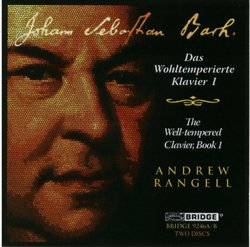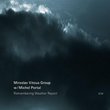| All Artists: Andrew Rangell Title: Well Tempered Clavier Book 1 Members Wishing: 0 Total Copies: 0 Label: Bridge Original Release Date: 1/1/2007 Re-Release Date: 11/6/2007 Genres: New Age, Classical Styles: Instrumental, Chamber Music, Forms & Genres, Improvisation, Historical Periods, Baroque (c.1600-1750), Classical (c.1770-1830) Number of Discs: 2 SwapaCD Credits: 2 UPC: 090404924620 |
Search - Andrew Rangell :: Well Tempered Clavier Book 1
 | Andrew Rangell Well Tempered Clavier Book 1 Genres: New Age, Classical
|
Larger Image |
CD DetailsSimilar CDs
|
CD ReviewsBrilliant, and perhaps not for everyone, but I love it Bradley P. Lehman | Dayton, VA USA | 05/06/2008 (5 out of 5 stars) "What an elliptical trip. I've heard more than 25 other recordings of this book on various instruments, and I play all of this myself on harpsichord. If the piece is going to be heard on piano, Rangell's is quickly becoming my favorite. He brings fresh thoughts and a sense of play to every phrase. His flexibility with rhythmic nuance rivals Wolfgang Rubsam's (playing some of Bach's other music on piano, but not the WTC), or Bradley Brookshire's Bach performances on harpsichord. The little pauses break up the flow and force the listener to pay attention. Abandon all hope of foursquare boredom, ye who enter here.
I suspect that some listeners will hate this. Rangell "messes with" the music too much, making it asymmetrical and quirky and unpredictable. He even changes some of the thematic notes, beyond his already enterprising ornamentation. Yes, listeners who expect a Tureckian "terraced everything" performance with everything in identical little boxes will probably be bewildered or annoyed by Rangell's capriciousness. It sounds as if the man is making up the music as he goes along, without any preconceived ideas about structure or balance. Sometimes his bass lines thunder more loudly than the other voices, for several phrases in succession. Tempos go up or down unpredictably. Some of the most felicitous ornamentation flits into place only once or twice and is never heard again. The details that Rangell comes up with are wilder and weirder than Glenn Gould and Joao-Carlos Martins (both his times), put together. Rangell's drive is often like Edwin Fischer's, but of course in much better sound. And the performance scarcely resembles the awesome poise in another of my favorite piano recordings, Edward Aldwell's. (But Rangell brings plenty of serenity, too, when he chooses to: try the B minor fugue.) I exclaimed aloud on first hearing Rangell's way with the G major prelude and fugue. The Well-Tempered Clavier can take this range. It can reward it. There's no need for Rangell's performance to agree with anybody else's, or to shoot for any average level of consensus. Rangell presses the limits in every direction, and the result sounds spontaneous. Should students try to learn something didactic from this performance? Perhaps something about the joy of adventure, I suppose, and the joy of not taking ONESELF too seriously. Rangell's performance takes the music seriously: as an invitation by Bach to go and do likewise, creating freshly inspired music that grabs the attention and doesn't let go. Any pedants are welcome to go throw the book at themselves. Rangell's way won't succumb to such restrictions. He's off-road. It works for me." |

 Track Listings (24) - Disc #1
Track Listings (24) - Disc #1

